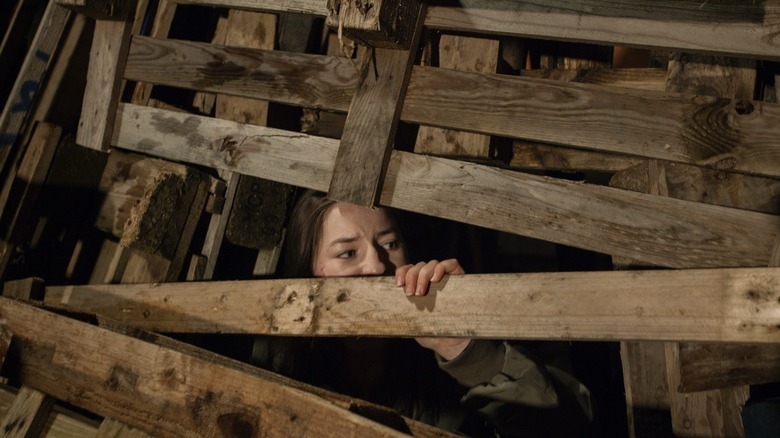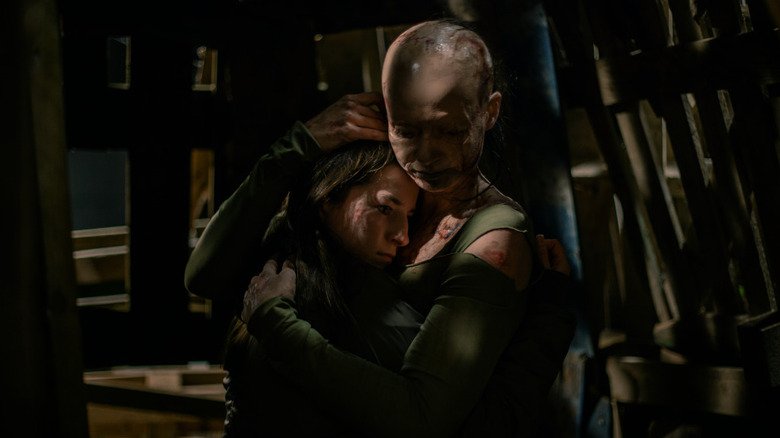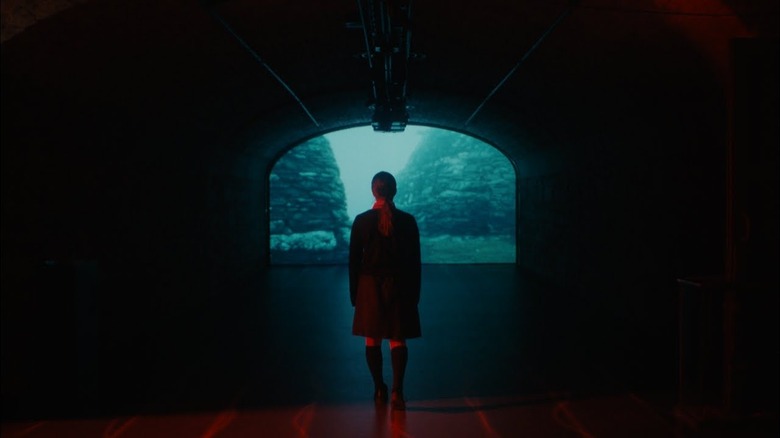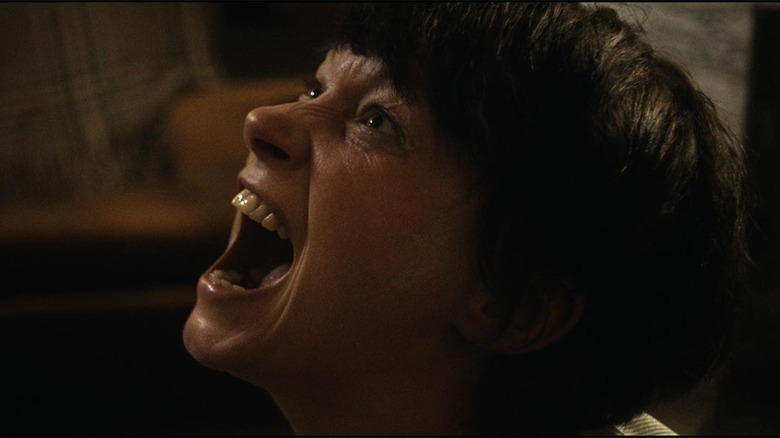You Are Not My Mother Director Kate Dolan On Halloween And Irish Folk Tales [Interview]
Changelings have a long history in Ireland. Now, another story is being told about the forest creatures in Kate Dolan's promising feature directorial, "You Are Not My Mother." In the film, Char's (Hazel Doupe) mother, Angela (Carolyn Bracken), goes missing and returns home one day ... changed. The less said about the plot, the better, but the horrors unfold next door in Dolan's Dublin and suburban-set film.
This is not the story of a family going out to the middle of the woods. "I think actually it's almost scarier to me that something terrible could be happening to you in your house," Dolan said, "and you're surrounded by neighbors who are right next to you, but they don't do anything about it. I think it's scarier to be surrounded by people and be isolated than to be actually isolated in a cabin in the woods." In a recent interview, Dolan shared stories with us about the creatures in the woods, the history of changelings, and the significance of Halloween in Ireland.
Warning: slight spoilers ahead.
'It's more enjoyable when it is unknowable'
When were you first introduced to changelings?
I think when you're Irish, you can't really pinpoint when. I feel like you're always told folk stories from when you're a kid. Even in primary school, they teach you a lot of myths and legends. You're learning about them when you're six or seven. There are songs based on some of the legends. It just becomes part of your culture, I suppose.
I think I got more interested when I was in college and you would actually read a bit more, getting interested in witchcraft and paganism and all those kinds of things. Then that history of Ireland, too, where our Gaelic holidays come from and they're very pagan in their root.
I think it has always been there, but I think when I started researching it more thoroughly, you do hear more the real world stories, I suppose, the impact of the folk tale. The real people who met tragic ends in real life because their family thought they were a changeling or they were thought to be something else.
That was really impactful to read about that, and then that was inspirational for the film. The idea that this could happen, the real world impacts of folk stories or fairy tales.
You probably could've gone with so many different directions and time periods, so how did your vision of this take on the fairy tale come about?
I feel like Irish folklore has been used in film and TV somewhat, but whenever I saw it depicted, it didn't really capture what I felt when I read the stories. It felt kind of twee in a way, or it didn't feel dark enough. A lot of the stories in our folk history are really dark. There are no happy endings, I don't think, in any of the stories, really.
It's always sad, tragic reasons for why people do things to each other, and what makes people good and what makes these people bad? I wanted it to feel different than what I'd seen before. I think really what you see in folklore a lot of the time is a cabin in the woods and a couple move there and they anger the forest spirit and then they have to do this or whatever.
I grew up in Dublin, in the city, but I would hear all these stories, and it was like you can still feel the pagan roots of the country, even when you're in the urban and the modern setting. I wanted to really show that and make a story that got to show a modern Dublin, that it's still that we never escaped that pagan history.
With, say, zombies or vampires, everyone knows the rules by this point. For changelings, how different is it writing them? How much do you feel you need to explain or keep a mystery?
The thing is, because our history is so much passed on by storytelling, there's actually not a lot of accounts of how to act — the rules. It's all very unknowable. Even when you read so much about it, it's still really unknowable. The only concrete rule is that they don't like fire. They like music, they like eating, they don't like iron or minerals. Those were the only rules to go on. I think folklore to me, it's more enjoyable when it is unknowable. I think the appeal is that you can't know what is actually happening?
Then I was looking at a lot of Asian horror movies, Japanese horror movies, and Korean horror movies. I love those kinds of movies because, like "Pulse" or "The Wailing." I think they're really cool movies in that they don't really explain anything to you, but they leave you with a feeling that you feel disturbed and you feel what's going on. It doesn't need to be explained to you as much. I liked that.
We did have definitely more dialogue in the script and there were edits we could have done where we explained more, but I think I wanted to keep it more unknowable so that the audience can talk about it after and they can make their own assumptions about what's happening.
'You don't know how to feel safe in your own house sometimes'
What were some other Asian horror films you were looking at?
It was just a whole realm of things as well. I liked reading their folklore, I did a lot of reading of different folklore histories. Because the changeling is also in Scandinavia as well. I think it's really interesting how many parallels there are. They have folk stories that feel very similar to some that we have, and it's like, how does that happen?
It really taps into something that is universal, before we were even connected in a way that we could share things so easily now with the internet. I think it's amazing that core fears and core thoughts can be shared across the world in these stories that just capture something that we all get.
I really like that they — I think in more Eastern belief, they don't have a good or evil. It's kind of ambiguous all the time. It's not necessarily that anybody's bad or good. They're just existing. A lot of Irish folklore is similar. The fairies are very much just existing and if you cross their path, that could end badly for you, but they're not really out to get you, necessarily. Sorry, I went on a ramble.
No, I find it fascinating. I mean, I just read changelings maybe want your car, and I just thought, "Well, where did that come from?"
Yeah, I don't know. There's a whole lot of weird stuff that you're just like, "What? Where did this come from?" I don't know, it's bizarre.
It's fun to learn about. You also depict mental health issues in the film. Whenever a horror movie does that, there are always questions about what the allegory stands for. Everyone will look at it differently, but how did you look at it?
Yeah. I suppose, as you say, you can never do it a hundred percent right because everyone takes their own perspective and everyone has their own life experience, which will impact how they view what you're saying in the film. I've had people in my life who suffered with mental health problems and I love them very much. I think that was brought into it, definitely, that you don't — it wasn't a judgment. It wasn't saying that people with mental health problems are monsters.
I think what we were really trying to do is capture the feeling of being a young person coming of age and how that feels as a child or a teenager, when you have a parent who suddenly is incapacitated in a way that you don't know how to deal with, and you don't know how to help them, and you don't know how to feel safe in your own house sometimes.
That was really what we wanted to capture. It was making sure that we captured that, because it is scary to be a child and see your parent in a way that you don't know what to do, but then just trying to stay nonjudgmental. I think, as well, that you're not saying that this is making parallels, but it's really hard. It's really hard to tread that ground. But, hopefully I think we did it better than some harm.
'She was really tapping into something that she was letting all her emotions out'
There's a very chilling scene that shows how much you scare someone with simplicity. The dance sequence, where "mother" starts to unleash a little. How was it writing, shooting, and cutting together that sequence?
I knew when I was writing this script, we knew it could be a really cool scene. It was one of my favorite scenes. I think it really captures what we were trying to say in the film. Also, it was always going to be a tricky one to pull off because it does have to be really strong performances that sells it.
I knew Carolyn, who plays Angela, the mother in the movie, she's not self-conscious at all. She was willing to push it as far as she could. She was very primal. She was really tapping into something that she was letting all her emotions out. While we were in prep, she showed me she was practicing with a track that the composer had made, which was really guttural, dark, traditional Irish music. Carolyn had sort of improvised this dance to it.
Then we got her to do it in the house with Hazel there as well. We ran through it a few times to see where she would go, and I did my shot list, or revised my shot list, based on how she was moving in space. I remember that time we rehearsed, Hazel was screaming and ran up the stairs and that was our rehearsal, so I was like, "Okay, I feel like this could be really good."
On set, I don't know how she did it, but we were all just really excited because you could tell her performance was just like she was giving it all. Editing it together was a real treat because we had her performance in almost every take. She gave it everything in every take, and we had such a wealth to choose from in that way.
It's funny: The song actually changed in the edit because we had this really guttural, dark traditional music. We were breaking the edit just before Christmas on the 23rd of December, and me and the editor sent the scene to the producer as a Christmas card, but with "All I Want for Christmas Is You" by Mariah Carey over it instead of the song that we had been editing to. Then we just watched it back and it was so disturbing to see the dance with a song that was upbeat because the juxtaposition of her behavior with the song was more scary than the composed track, which was very dark.
Then we just started looking for a song to put in it instead. We found an Irish kind of Tom Jones we have in Ireland called Joe Dolan, and he has this song called "You're Such a Good Looking Woman." We were like, "What vinyls would Granny have in her house?" That was one that we thought she would have.
You use Halloween time in this movie for atmosphere, but it actually has real significance in the story given its history in Ireland and the fire. Was that story always written for Halloween?
In initial drafts, I think the first draft of the script, it wasn't at Halloween. As I was writing, I was reading books about pagan holidays and witchcraft and all that kind of stuff. I was looking for the climax of the film and we knew the folklore is that changelings are burnt out by fire. A lot of the accounts of burning out a changeling, it's, "You bring them to a fire, you put them in a fire."
Then it just clicked one day. I was like, "Of course it's a bonfire because it's Halloween." Because in Ireland, we have our bonfires everywhere on Halloween night. I was delighted because I was like, "Yeah, it's my first debut movie. I'm going to set it at Halloween because I love Halloween."
It became part of it then because it just made sense. It's the time of year when in Samhain, when you read about Samhain, they lit the bonfires to keep spirits at bay and the dead would come back and the fairies could come through into our world at that time since the veil is very thin and all that.
I think Irish Halloween is very different from — well, not very different, but the bonfires and the pagan element is still very much part of it. I wanted to see that in a film, because I had never really seen that before.
I wish that we could have got more footage on an actual Halloween, because when we shot it, it was November 2020. We were meant to go out on Halloween night just before we started shooting to shoot B-roll to have for the Halloween sequence.
But Ireland got put into a second lockdown the week before, so Halloween was canceled. There weren't even trick-or-treaters allowed or bonfires or anything, so there was nothing for us to film. You didn't get to see the true essence of what Halloween here can be, which is a shame.
"You Are Not My Mother" is available in theaters and on VOD on March 25th.



